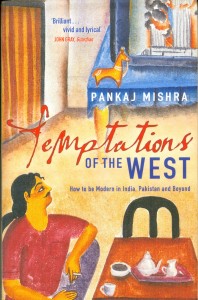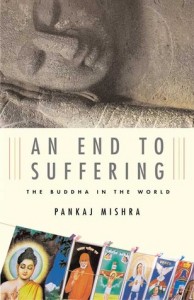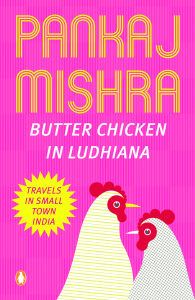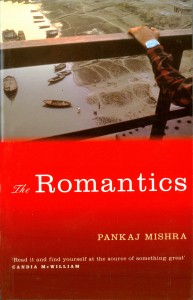From the Ruins of Empire
In his brilliant new book Pankaj Mishra reverses the long gaze of the West upon the East, showing modern history as it has been felt by the majority of the world’s population from Turkey to China. These are the amazing stories of the grandfathers of today’s angry Asians. Excellent!—Orhan Pamuk
After Edward Said’s masterpiece Orientalism, From the Ruins of Empire offers another bracing view of the history of the modern world. Pankaj Mishra, a brilliant author of wide learning, takes us through, with his skillful and captivating narration, interlinked historical events across Japan, China, Turkey, Iran, India, Egypt, and Vietnam, opening up a fresh dialogue with and between such major Asian reformers, intellectuals, and revolutionaries as Liang Qichao, Tagore, Jamal al-din al-Afghani, and Sun Yatsen—Wang Hui, author of China’s New Order and The Rise of Modern Chinese Thought and Professor of Chinese Intellectual History at Tsinghua University, Beijing
From the Ruins of Empire jolts our historical imagination and suddenly places it on the right, though deeply repressed, axis. It is a book of vast and wondrous learning and delightful and surprising associations that will give a new meaning to a liberation geography. From close and careful readings of some mighty Asian intellectuals of the last two centuries who have rarely been placed in this creative and daring conversation with each other, Pankaj Mishra has discovered and revealed, against the grain of conventional and cliched bifurcations of ‘The West and the Rest,’ a continental shift in our historical consciousness that will define a whole new spectrum of critical thinking—Hamid Dabashi, Columbia University
 Temptations of the West: How to be Modern in India, Pakistan, Tibet and Beyond
Temptations of the West: How to be Modern in India, Pakistan, Tibet and Beyond
It is impossible in a short form to do justice to the density and complexity of his arguments, to his comprehensive illustrations, to his scathing demolition of the comfort zones of both East and West, and to the intrepid and endlessly questioning spirit which lies behind his book—Hilary Mantel, New York Review of Books.
Unusually insightful and eloquent, Mishra deftly deciphers forces political, religious, and economic; vividly profiles remarkable individuals; and, most resonantly, expresses compassion for all who are forced to live in fear—Donna Seaman, Booklist
Mishra has a talent for discovering extraordinary, even lurid characters to illuminate his account of dashed dreams, clashing religions, huge wealth, crushing poverty, corruption, oppression and, almost unbelievably, hope. A brave book—and, for anyone in the West able to look beyond clichés and rhetoric, an essential one—Ben Mcintyre, New York Times.
Mishra tells the reader more about the true condition of much of Asia today than can be gleaned from any number of weighty academic tomes…In the end this subtle, vivid and inexhaustibly thought-provoking book is as much about the illusions that rule the West as it is about lands that lie beyond its frontiers—John Gray, The Guardian
 An End to Suffering: The Buddha in the World
An End to Suffering: The Buddha in the World
The best literary non-fiction Indian book in a decade and one of the most beautiful books ever published in Buddhist literature—Pradeep Sebastian, The Hindu
An End to Suffering poignantly captures one of the most intellectually and morally radical responses ever conceived to the challenge of suffering—Pratap Bhanu Mehta, Biblio
The rare writer who is at ease as a historian, philosopher, traveler, and memoirist, and the combination of roles allows him to produce a book that few others could even have attempted—Pico Iyer, New York Review of Books
Mishra’s book is in the best tradition of Buddhism, both dispassionate and deeply engaged, complicated and simple, erudite and profoundly humane—Adam Goodheart, The New York Times
It is a tribute to Mishra’s ability to link India’s past to its present that he has turned a book on the Buddha into a social commentary of immense urgency—Aravind Adiga, Time
The Romantics: A Novel
A supernova in the wan firmament of recent fiction…Mishra’s humanity and emotional clarity are rare in so young a writer—Marie Arana, Washington Post
A first novel of astonishing maturity. It has virtually none of the rawness of apprentice-work and a great deal of that calm authority which one associates with writers in their prime—David Robson, Daily Telegraph
Pankaj Mishra’s The Romantics has a luminous intelligence about love, literature and politics in Benares that make him the Indian Turgenev—Amanda Craig, The Times
Continuously absorbing, beautifully modulated and shaded…the past and present states of many worlds, Indian and European, seem to have come as if without effort to the surface—John Bayley, New York Review of Books
A voice that fuses the lapidary precision of Flaubert with the meditative lyricism of Waugh’s Brideshead Revisited, a voice that’s alternately wry and ruminative, meticulous and expansive—Michiko Kakutani, New York Times
 Butter Chicken in Ludhiana: Travels in Small Town India
Butter Chicken in Ludhiana: Travels in Small Town India
A marvellous travel book about small-town India, where the village and the city, the folk and the kitsch, and the comic and the violent threaten to converge—Ashis Nandy
One of the most disturbing and entertaining descriptions of the upwardly mobile classes in provincial India—Ian Buruma
A classic of Indian non-fiction….For all that it is a serious work, Butter Chicken in Ludhiana is a very funny book: Mishra can be both appalled and amused by what he sees and hears, and the characteristic confusion and comedy of Indian life leaps off these pages—Chandrahas Choudhuri
A love-letter to the real republic. No other book defines as clearly, and with such troubled irony, our last decade of change—Amitava Kumar

